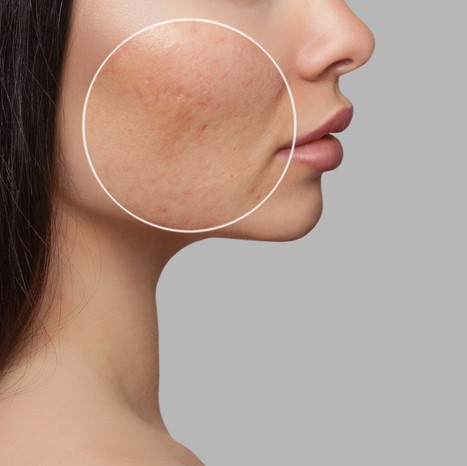At St. Louis Dermatology & Cosmetic Surgery, we offer comprehensive treatments for scars caused by acne, surgery, or injuries. Treatment is individualized to your scar and treatment goals.
If you have a scar that you want to minimize, you may wonder if there’s a way to treat it. While a scar may never completely go away, specific treatments can help reduce its size and change its appearance.

When our skin is injured, scarring is a natural part of the healing process. A burn injury, acne, or trauma, such as surgery, can cause a scar on the skin. Some scars can be easily concealed if they’re small or in a location that’s easy to hide. However, other scars are prominent and can make a person self-conscious.
At St. Louis Dermatology & Cosmetic Surgery, we offer comprehensive treatments for scars caused by acne, surgery, or injuries. Treatment is individualized to your scar and treatment goals.
Types of Scars We Can Treat
Scarring can occur for many different reasons. Fortunately, we offer comprehensive scar treatments individualized to your goals and scars. Some of the most common types of scars we can treat include:
- Acne Scars – Acne scars are formed from cystic acne. You should make sure your acne has been treated or is resolved before undergoing acne scar treatment. Once your acne is under control, you can pursue treatment for your acne scars.
- Raised Scars / Hypertrophic scars / Keloidal scars – Raised scars, also known as hypertrophic scars or keloidal scars, are prevalent. Hypertrophic scars are raised in the area of trauma. Keloidal scars produce excessive scar tissue such that the scar is larger than the initial injury. For example, after an ear piercing, a large keloid forms on the backside of your ear.
- Depressed Scars / Atrophic Scars – These scars lack collagen and elastic tissue, contributing to their depressed or atrophic appearance. This type of scar treatment focuses on increasing the collagen and elastic tissue and replacing lost tissue.
- Traumatic Scars / Injury Scars – Traumatic scars caused by car accidents, dog bites, burns, or other accidents can be very upsetting. We will listen to you to understand what you want to achieve with scar revision. Dr. Beal will then discuss different treatment options which are individualized to achieve your goals best.
- Discolored or Darkened Scars – Injury to the skin can produce darker or lighter scars than your normal skin. Sometimes we can replace the lost melanocytes for lighter scars, and we can use treatments to lighten the scars for darker scars.
Board-Certified Cosmetic Dermatologist
Brandon T. Beal, MD, FAAD, is a Board-Certified Cosmetic Dermatologist, Mohs Surgeon, and Facial Plastic and Reconstructive Surgeon. He works closely with each patient to help you achieve your goals. Before any treatment, Dr. Beal wants to understand your aesthetic concerns. He will explain different treatment options and, together with you, come up with an individualized treatment plan to help you accomplish your unique goals.

Thanks for sharing this marvelous post. I’m very pleased to read this article. I enjoy this site – it’s so useful and helpful.
Your article demonstrates a wealth of knowledge and expertise in scar revision treatments, instilling confidence in readers who may be seeking solutions for their scars. It serves as a valuable resource and a testament to your commitment to patient education.
Thank you for sharing such informative content and for your dedication to helping individuals achieve their desired results in scar revision.